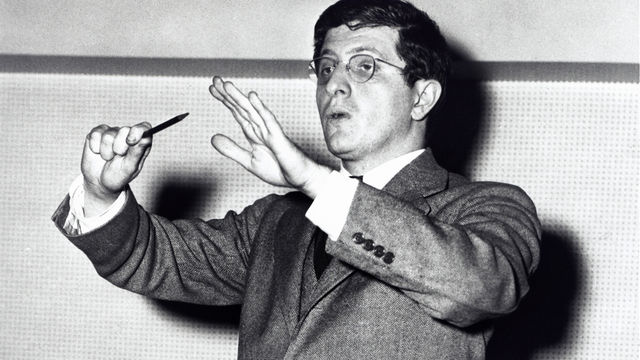Sir Matthew Bourne’s new ballet, based on the Powell and Pressburger film The Red Shoes, uses music by Bernard Herrmann, best remembered for the screeching string accompaniment to the shower scene in Psycho. Ken Wilson reflects on one of the most famous Hollywood composers…
After a rancorous disagreement, Bernard Herrmann said to Alfred Hitchcock, ‘I had a career before you. I’ll have one after’. They never spoke again. Hitch wanted something in the pop idiom in his new film Torn Curtain – it was 1966 and movies like The Umbrellas of Cherbourg and Bonnie and Clyde had crossover hits that made the charts (and helped promote the films).
Torn Curtain was not Hitch at his best, but it wasn’t his worst picture – a pop tune theme might have boosted its fortunes, but a Herrmann score would have helped it even more. Pop was not Herrmann’s forte and he refused to work on anything other than a symphonic score. The unused soundtrack was later recorded by, among others, the Royal Scottish National Orchestra. A couple of years after the Torn Curtain falling out, Patrick McGilligan observes in his biography of Hitchcock, Herrmann visited the Master of Suspense on the set of his next film hoping to let bygones be bygones. Hitch wouldn’t see him.
All told, Hitchcock and Herrmann worked on eight movies together from The Trouble With Harry (1955) to Marnie (1964). Arguably the films would have been lesser had Herrmann not been involved. Herrmann was most famous for his work on the infamous shower scene in Hitch’s Psycho. Norman Bates’s slashing kitchen knife was choreographed to Herrmann’s screeching strings. The composer was also sound consultant on The Birds, which had no music in it at all. He even appeared on screen in Hitch’s The Man Who Knew Too Much in 1956 playing the conductor in the thrilling Albert Hall finale. It’s curious to think that Benny Herrmann worked on two of the most admired films ever made: Citizen Kane and Vertigo and both are a testament to the creative collaboration between director and composer that is at the heart of movie-making.
Herrmann was a prodigious early talent. He studied at New York University and the Juilliard music conservatory. His influences were Wagner, Beethoven, Debussy and Ravel and he was a serious composer of opera, ballet and symphonic works. Working at CBS he did the music for the band in Welles’s famous radio play The War of the Worlds and used eerie effects in The Ghost and Mrs Muir and the sci-fi classic The Day the Earth Stood Still. He also worked on several Ray Harryhausen movies. Towards the end of his career Bernard Herrmann was approached by Martin Scorsese and he provided the music for Taxi Driver.
Herrmann arrived in Hollywood in 1941, worked on Citizen Kane when he was only 30 and was nominated for two Oscars that year (he won only one in his lifetime). He met Hitchcock in the mid-50s. The reason that they got on so well together was in part, writes McGilligan, due to the fact that they were ‘both practical artists who felt most comfortable collaborating with people they liked and admired.’
Herrmann’s sophisticated dramatic music fitted perfectly with Hitch’s psychologically sophisticated storytelling. North by Northwest showed Hitchcock’s effective use of silences (as in the crop-dusting plane attack sequence) which was counterpointed by music used elsewhere. The Vertigo soundtrack – with its insistent theme – is perhaps the finest Herrmann/Hitchcock alliance of them all.
The only film composer to receive a lengthy entry in David Thomson’s inestimable Biographical Dictionary of Film, Herrmann could as easily turn his hand to action sequences as romantic interludes and even horror. Writes Thomson: ‘the score of Taxi Driver is universally cinematic: it speaks to sitting in the dark full of dread and desire, watching’.
Herrmann was a huge influence on other music makers. It was said that producer George Martin was inspired by Herrmann in his use of insistent strings in the Beatles hit Eleanor Rigby. The Vertigo theme was used in the 2011 Oscar winner The Artist and Lady Gaga’s bizarro pop video Born This Way opens with the same music.
Herrmann moved to London in 1971 and lived there with his third wife until he died at the age of only 64. He married Norma Shepherd in 1967. She was 30 years his junior. ‘Although he is often remembered for the chilling, frightening stuff,’ Norma Herrmann once said, ‘Benny was really a huge romantic.’
Ballet director Matthew Bourne’s choice of Herrmann for his reboot of The Red Shoes makes sense. ‘Music culled from Hollywood composer Bernard Herrmann’s early scores (including Citizen Kane and The Ghost and Mrs Muir) is a revelation. Sensitively orchestrated by Terry Davies, it’s plushly romantic, but with razors tucked into the velvet melodies,’ wrote the Guardian critic David Jays.
Bourne admits that he didn’t want to replicate the movie so repurposed Herrmann’s music. The score reflects the darkness in the ballet’s story and it is hugely effective. This delirious music is from the 1940s which is when the ballet is set. Herrmann’s music, says Bourne, ‘is romantic but never in a slushy way’.
Matthew Bourne’s ballet The Red Shoes is at Festival Theatre, Edinburgh, Tue 9 – Sat 13 May and King’s Theatre, Glasgow, Tue 6 – Sat 10 June
